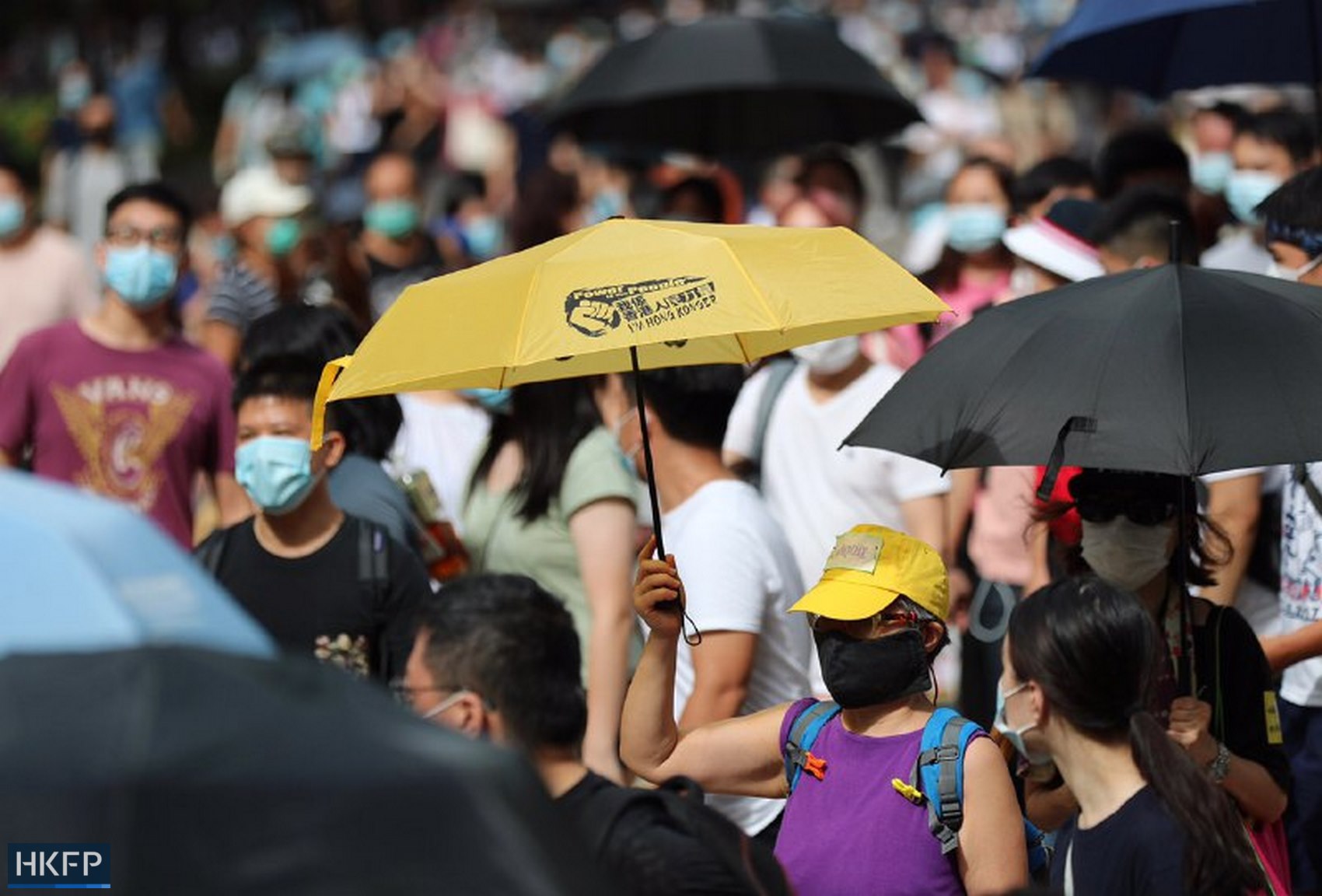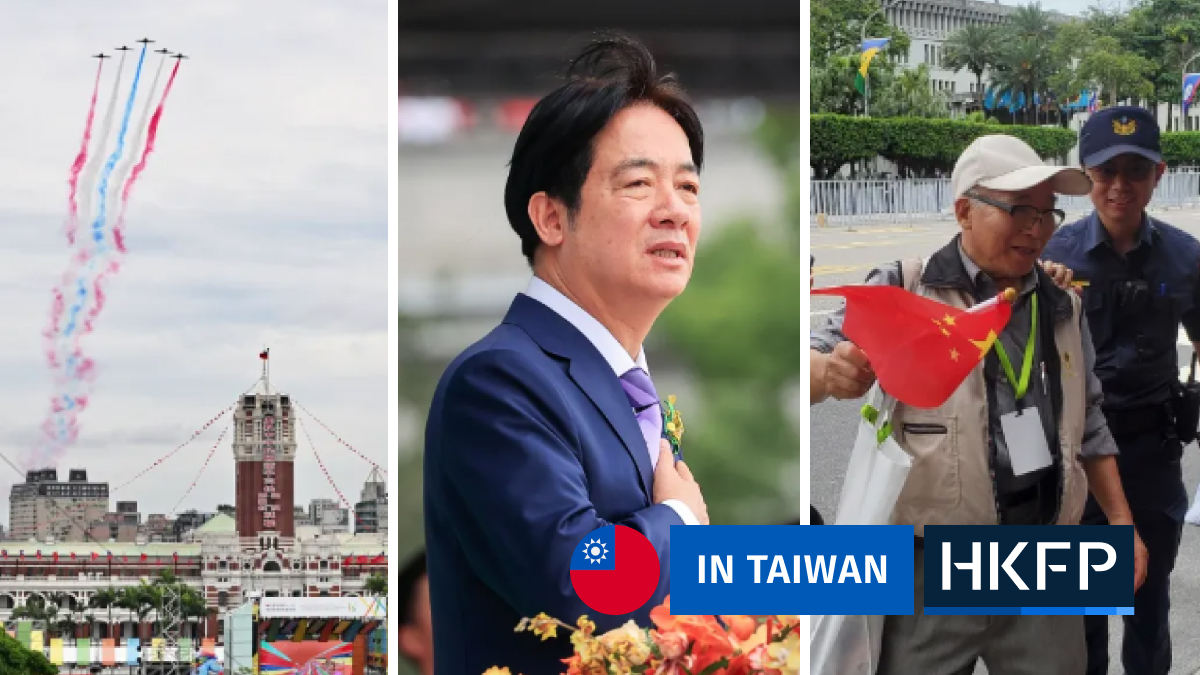Hong Kong police lost legitimacy during the 2019 protests due to “inept” decision-making by their commanders and a lack of coordination, British policing expert Clifford Stott told HKFP.
His comments followed Tuesday’s publication of his report on the role police played in the radicalisation of last year’s pro-democracy movement.
Stott, a professor in group psychology and the dynamics of crowd behaviour, said he believed the disintegration of legitimacy in the eyes of protesters was the unintended consequence of what he called “completely inept policing.”

“I think the conclusion one should draw is actually that the public order commanders were very bad at their job,” he said. “When one looks at the evidence across the whole sequence of events, you can see some really, really poor decision-making.”
Speaking about controversial police behaviour towards protesters last year, Stott said it was more likely that it stemmed from botched tactics than political motivations. “Having decades of experience in this context, I am a great believer in cock-up versus conspiracy,” he told HKFP in an interview on Thursday.
“The assumption that somehow these police officers are so sophisticated as political actors that they can work in a way to predict what’s going to happen politically from a tactical decision on the ground… is stretching credibility too far.”
Commenting on his report’s findings, Stott pinpoints two key incidents which marked a shift in protester attitudes towards police: the clashes of June 12 outside the Legislative Council Building and the Yuen Long mob attacks of July 21.
“It was very poor decision-making on the 12th,” he said referring to an incident where police deployed tear gas and trapped protesters outside CITIC tower in Admiralty. “I don’t believe the evidence is there to sustain the idea that the tactical intervention with the use of tear gas… was conspiratorial,” he said.
“It was a frontline decision. What you see from those frontline commanders is that two of them make decisions independently that lead them to fire tear gas into different but closely-interrelated areas. And then you get units charging into those areas. Not because they were coordinated, but because they lacked coordination.”
According to Stott’s research, it was this “ineffective decision-making” that sparked a change in how protesters viewed the police. “You get this phased evolution in development that comes as a consequence of these poor and ineffective decisions… that have the unintended consequence of empowering a more radical form of protesting that evolves and develops over time.”
The professor said the indiscriminate use of force by police created a sense of cameraderie among protesters which in turn empowered them to turn to more radical forms of protest. “Firing tear gas against a whole crowd, dispersing a crowd of 24,000 people by charging into them with batons and shields, is inherently indiscriminate,” he said.

“Where confronted in a crowd with indiscriminate force by the police, everybody finds themselves in the same situation. That creates a psychological unity that wasn’t there before.”
“That psychological unity is the basis on which they can act collectively against what they see as illegitimate police intervention… it also creates a sense of empowerment so people don’t just feel that they’ve got the right to resist the police, they also feel united and capable enough to fight back.”
“What we know is, the psychology of ‘riot’ is a direct product of particular styles of police intervention,” the professor said.
Evolving over time
Stott’s report, published by the Oxford University Press on Tuesday, drew on behavioural psychological analysis of interviews with 17 protesters.
“The first thing we did in the study… was to spend considerable effort on trying to map what went on behaviourally. So people are clear what it is we actually need to explain,” he said. “That’s one of the things that goes wrong here, that people’s analysis isn’t actually embedded in a clear understanding about what actually had happened. Any objective analysis has to be based on an objective analysis of what happened behaviourally.”
Stott told HKFP his report stemmed from a desire to understand why the protests spiralled into the violence which culminated in the brutal siege of Hong Kong Polytechnic University.

“The idea that the protests were marked by violence and petrol bombs is only true of the latter phases. It’s not true of the beginning. There was no violence, there were no petrol bombs on June 9, there was no violence and confrontation on the 16th,” he said, referencing the mass demonstrations by hundreds of thousands of people which saw the beginning of the movement’s “five demands”.
Three of those five demands directly related to police behaviour on June 12.
“You have to be nuanced in understanding the dynamics of the event as it evolves over time. The question we’re asking is, how did it get to the point where there is so much violence and confrontation, because it didn’t begin like that,” he said.
Stott also questioned police inaction during the storming of LegCo on July 1 when protesters vandalised and occupied the legislative building while officers stood by.
“It’s this complex set of factors that interrelate to one another over time where the protests, which begin largely peacefully, evolve over time as a function of multiple events and multiple interactions to culminate in an outcome which is far more violent and confrontational,” he said.
“If we understand that, then we have to accept that what the police did was part of the dynamics through which the outcomes occur… to try and extract the police and somehow say ‘Well, the police had nothing to do with that’ is unsustainable – evidentially, theoretically, it’s just not what happened.”
Contributing objectivity
Asked what he hoped his paper would achieve, Stott said he felt it had already achieved its aims. “My job as an… academic is to produce scientific analysis of protests and to develop understanding internationally of the dynamics through which such protests come about.”
“There’s this assumption that I’m trying to do something politically. That’s not my motivation. My motivation is to produce good science. Obviously, my science has political implications and I can’t avoid that,” he said.
“I have a personal view about what’s going on in Hong Kong but that’s not reflected in my science. My science is my science. That’s what I’m seeking to achieve here.”

Last December, the Keele University professor and four of his fellow experts withdrew from a foreign expert advisory panel on an IPCC investigation into allegations of police brutality during the 2019 protest movement. They cited the body’s lack of independence and investigatory power.
The IPCC report was released in May and largely cleared the police of any misconduct. Stott said the report was proof of the panel’s misgivings. “We were critical of the IPCC because we argued that it didn’t have the necessary powers to extract the evidence… to provide objectivity. When the report was published, it was clear that our criticisms were valid because that report does lack objectivity in its analysis.”
Stott told HKFP that he hoped his own findings can complement the IPCC’s “highly problematic” report. “Where there are problems with the IPCC report is that there is a systematic absence of a particular kind of data, that is data from protesters about protester psychology. Our study seeks to complement that, by providing an analysis of protesters’ behaviour and psychology.”
The Independent Police Complaints Council (IPCC) is an official Hong Kong watchdog tasked with reviewing the work of the Complaints Against Police Office – a unit of the police force which investigates complaints. The Council reports directly to the chief executive.
Limits of IPCC
Stott and the panel’s criticisms about the IPCC’s lack of “genuine structural independence” from the police force were echoed by the High Court on Thursday, which found the city’s current complaint mechanisms against the police force to be “inadequate.”
Commenting on the court’s ruling later the same day, Stott said the ruling validated their concerns. “At some level it confirms and validates our concerns about the structural relationship with the IPCC with the Hong Kong Police force.”
“A genuinely independent police complaint body would not require people to make their complaints to the police first. They should be able to complain directly to the police complaint authority,” he said.

Stott said existing complaint mechanisms fell short of international standards in terms of independence.
“We were aware that many people who felt grievances against their treatment by the police during the protests would not come forward to complain about that police activity because they would be arrested… Simply being present at that event was essentially a criminal offence,” he said.
Looking to the future of Hong Kong policing, Stott said it must be understood within the city’s wider historical context. “As context changes, that context shapes and redefines how a population sees the legitimacy of policing… to understand the changing context of Hong Kong, one can’t ignore that Hong Kong is on a journey… it was, in 1997, set out as a 50-year journey.”
“There’s a journey going on here. All of these are transition points of that journey, of that growing incorporation of Hong Kong into one country.”
Support HKFP | Policies & Ethics | Error/typo? | Contact Us | Newsletter | Transparency & Annual Report | Apps
Help safeguard press freedom & keep HKFP free for all readers by supporting our team

LATEST FROM HKFP
HKFP has an impartial stance, transparent funding, and balanced coverage guided by an Ethics Code and Corrections Policy.
Support press freedom & help us surpass 1,000 monthly Patrons: 100% independent, governed by an ethics code & not-for-profit.











